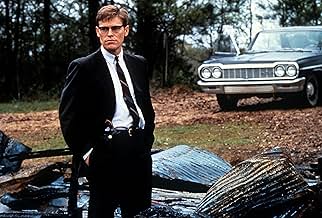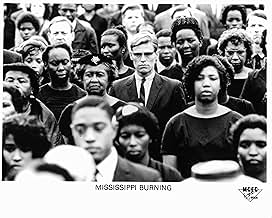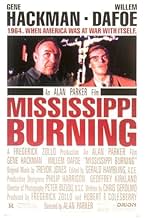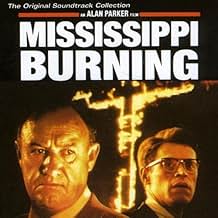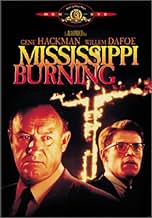Mississippi Burning
- 1988
- Tous publics
- 2h 8min
Deux agents du FBI aux styles très différents arrivent dans l'état du Mississippi pour enquêter sur la disparition de militants pour les droits civiques.Deux agents du FBI aux styles très différents arrivent dans l'état du Mississippi pour enquêter sur la disparition de militants pour les droits civiques.Deux agents du FBI aux styles très différents arrivent dans l'état du Mississippi pour enquêter sur la disparition de militants pour les droits civiques.
- Réalisation
- Scénario
- Casting principal
- Récompensé par 1 Oscar
- 17 victoires et 25 nominations au total
- Judge
- (as Tom Mason)
Résumé
Avis à la une
Director Alan Parker has been down this road before with Midnight Express, another crushing, gut-wrenching tale based on a true story. In both cases, a great deal of liberty is taken with the facts, but that doesn't matter. Mississippi Burning is not a docudrama or an A & E special, it is at its heart, a police drama, and a near perfect one at that.
It is criticized by some for its depiction of southerners of the time as a group of brain-dead racists with no moral fiber whatsoever. I don't believe that is the movie's intention, but it spends time showing this side of society to make us understand how hate breeds itself, and how it becomes a way of life and an accepted standard. As one character states, "When we were seven years old, they told us that segregation was in the bible. You hear that long enough, you start to believe it".
Mississippi Burning won a (well-deserved) Oscar for cinematography, but sat and watched Rain Main take home the majors. It was clearly the best film of 1988 and stands as one of the great works of American cinema of the 80's. Hackman and Dafoe are at their best, and Frances McDormand delivers a beautifully understated, powerful performance as the deputy's wife - a woman at war with her sense of right and wrong, struggling with fear and loyalty. Her character is the centerpiece of the movie.
This is not a preachy or melodramatic movie. You won't get a lecture on why racism is wrong. You will get an rich, engaging crime drama depicting a pivotal time in American History, and you will never forget it.
**** out of ****.
Based on actual events in Philadelphia, the screenplay centers chiefly on the hostility relationship between the two FBI agents (Gene Hackman and Willem Dafoe) sent down to the small Mississippi town to seek information about the vanishing of the three victims Immediately upon their arrival, they are greeted with hostility by the local law enforcement and the town in general
Dafoe's Ward in charge of the casecomes off as the embodiment of everything those men in the south dislike about the "Yankees" who are coming down there commanding them how to act
Anderson(Hackman), who was once a Mississippi officer himself, has a special feel for how to settle things with Southerners He uses his charm to win the confidence of the friendly wife of a Klansman deputy, whom he suspects holds the key to unravel the details of the case
The scenes between McDormand and Hackman are the best of the film They dramatize how quickly two lonely people can match...
The film succeeds by being gripping, emotional, and disturbing Alan parker graphically explores the hatred, motivations and mentality that were once flaming through the American society in the 60's.
Le saviez-vous
- AnecdotesThe film is inspired by the murder of voting rights activists James Chaney, Michael Schwerner, and Andrew Goodman by the Ku Klux Klan.
- GaffesWhen Anderson throws Pell into the chairs at the barbershop, Pell's stunt double has a different hairstyle (balding, with a comb-over).
- Citations
Ward: Where does it come from? All this hatred?
Anderson: You know, when I was a little boy, there was an old negro farmer that lived down the road from us, name of Monroe. And he was... well, I guess he was just a little luckier than my daddy was. He bought himself a mule. That was a big deal around that town. My daddy hated that mule, 'cause his friends were always kidding him that they saw Monroe out plowing with his new mule, and Monroe was going to rent another field now he had a mule. One morning, that mule showed up dead. They poisoned the water. After that, there wasn't any mention about that mule around my daddy. It just never came up. One time, we were driving down that road, and we passed Monroe's place and we saw it was empty. He just packed up and left, I guess, he must of went up north or something. I looked over at my daddy's face. I knew he done it. He saw that I knew. He was ashamed. I guess he was ashamed. He looked at me and said, If you ain't better than a nigger, son, who are you better than?
Ward: You think that's an excuse?
Anderson: No it's not an excuse. It's just a story about my daddy.
Ward: Where's that leave you?
Anderson: My old man was just so full of hate that he didn't know that bein' poor was what was killing him.
- Bandes originalesTake My Hand Precious Lord
Words and Music by Thomas A. Dorsey
Performed by Mahalia Jackson
Courtesy of CBS Records
Meilleurs choix
- How long is Mississippi Burning?Alimenté par Alexa
Détails
Box-office
- Budget
- 15 000 000 $US (estimé)
- Montant brut aux États-Unis et au Canada
- 34 603 943 $US
- Week-end de sortie aux États-Unis et au Canada
- 225 034 $US
- 11 déc. 1988
- Montant brut mondial
- 34 603 943 $US
Contribuer à cette page






